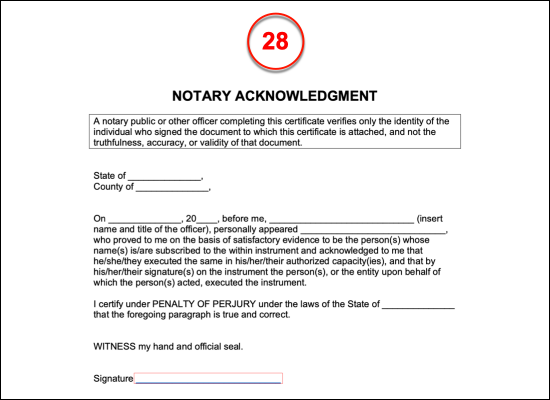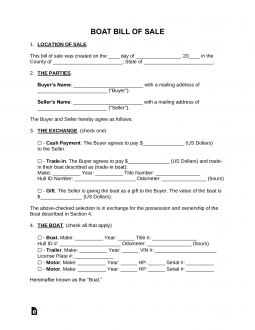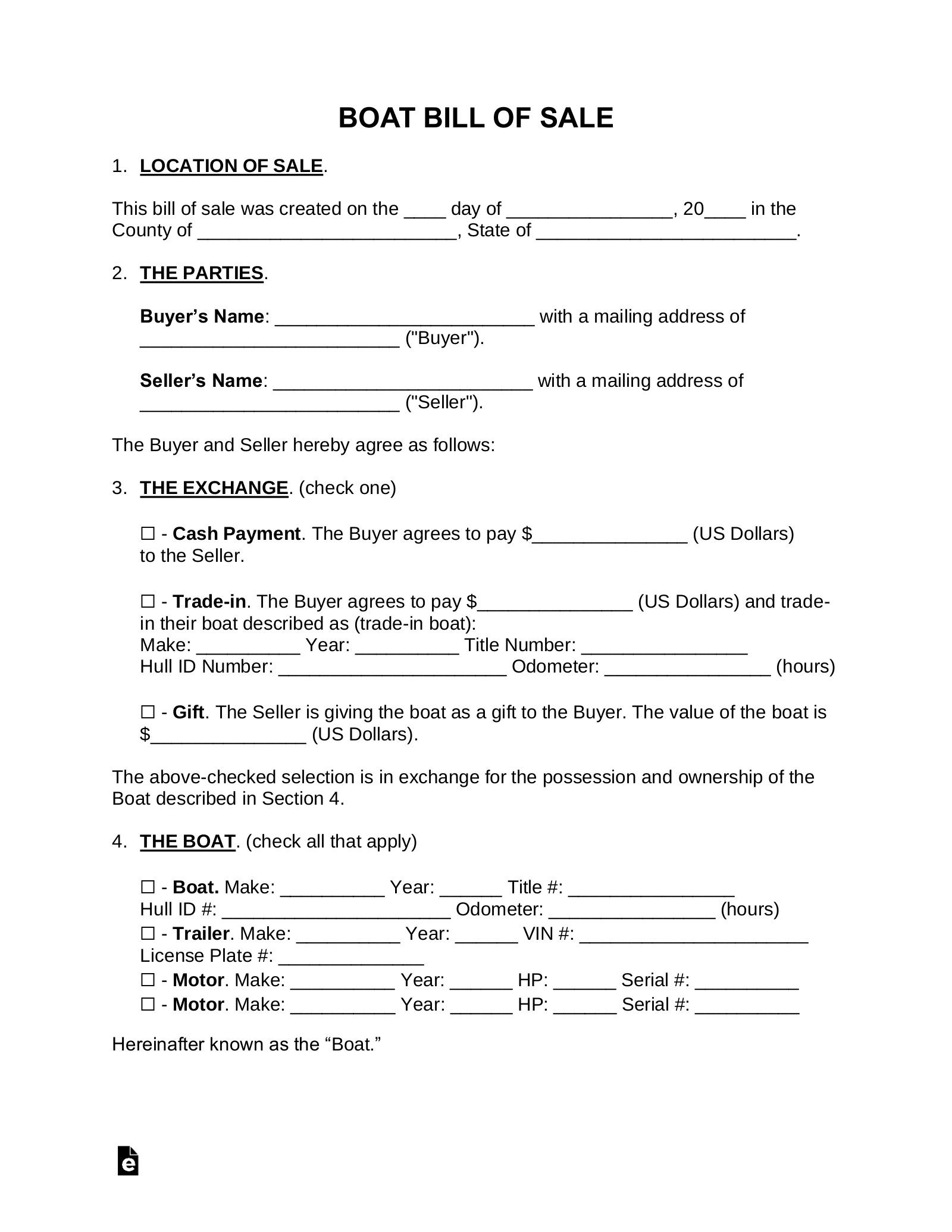Updated June 23, 2023
A boat bill of sale is a document used to record the change of ownership of a watercraft. A boat bill of sale may be used for any motorized or non-motorized vessel and is required in most jurisdictions in order to register after purchase.
Once signed, the sale becomes final whether or not the funds have been given to the seller. Therefore, it’s highly recommended the seller does not authorize a bill of sale until paid in full.
By State
- Alabama
- Alaska
- Arizona
- Arkansas
- California
- Colorado
- Connecticut
- Delaware
- Florida
- Georgia
- Hawaii
- Idaho
- Illinois
- Indiana
- Iowa
- Kansas
- Kentucky
- Louisiana
- Maine
- Maryland
- Massachusetts
- Michigan
- Minnesota
- Mississippi
- Missouri
- Montana
- Nebraska
- Nevada
- New Hampshire
- New Jersey
- New Mexico
- New York
- North Carolina
- North Dakota
- Ohio
- Oklahoma
- Oregon
- Pennsylvania
- Rhode Island
- South Carolina
- South Dakota
- Tennessee
- Texas
- Utah
- Vermont
- Virginia
- Washington
- Washington D.C.
- West Virginia
- Wisconsin
- Wyoming
Table of Contents |
What is a Boat Bill of Sale?
A boat bill of sale is used when you have made the decision to sell your boat and is one of the many essential documents needed to make the transfer of title successful. Whether purchasing or selling a boat, a bill of sale must be included in the transaction.
A bill of sale helps protect the buyer from accusations of fraud by showing proof of payment in good faith while also protecting the Seller if any problems are to arise after the sale.
Common Types (10)
- Canoe
- Catamaran
- Kayak
- Jet Ski
- Motor/powerboat
- Rowboat
- Sailboat
- Skiff
- Tugboat
- Yacht
What Should be Included?
- Boat Details
- Make
- Year
- Title Number
- Hull ID
- Odometer reading (hours)
- Buyer’s Details
- Seller Details
- Purchase Price
- Location
How to Buy/Sell a Boat (7 steps)
Step 1 – Decide what You’re Selling

When an individual decides to sell their boat he or she must decide what will be going along with the boat, including but not limited to, outboard motor(s), trailer(s), life jackets, and other gear. Whether or not these items are included will determine the final value of the sales price depending on if it’s wanted by the buyer.
Step 2 – How Much is Your Boat Worth?

This will most likely be the most difficult part of the process. Most owners know, more or less, the value of their boat. In the chance you do not know the value, using this online listing can give you a general range of what to look for. Otherwise, a seller’s best bet is to look up what the exact make, model, and year of the boat is selling for in your market.
Step 3 – Listing the Boat for Sale
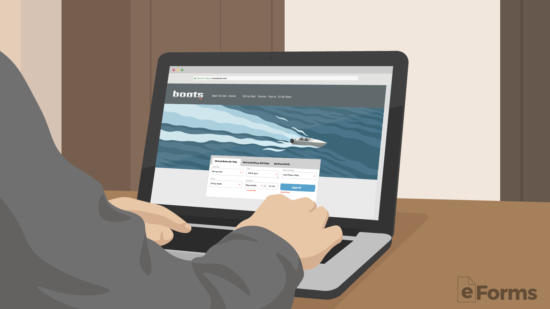
The first question to ask yourself is, “Do I need a broker?”
Hiring a Broker – Generally, if the boat will be selling for more than $40,000, then it’s best to hire a broker at a local marina. They will not only list it for the fair market value but also clean the boat and make it presentable to potential buyers.
Selling it Yourself – If the value is under $40,000 then it’s advised to sell the boat yourself. Most brokers will not accept a boat lower than this amount.
In either case, if the seller decides to list the boat on their own it’s best to use the following websites (5):
Before you even think about listing your boat online or with a broker, it’s a good idea to clean and brush up your boat, whether that’s by making cost-worthy repairs or by hiring a cleaning service to give your boat the best opportunity to sell. First impressions can go a long way.
Step 4 – Presenting the Boat to Buyers

Depending on the location of the boat, it can be a challenge to show to potential buyers. For example, if your boat is on a mooring, it will be harder for potential buyers to see its exterior as you will need to skiff people to and from the boat every time someone wants to take a look. The best possible option is to have your boat stationed to a dock for easy access, this way buyers can get a true sense of what it’s like to be on your boat in the water.
If docking is not a viable option, the next best and cheapest way of viewing is to park your boat on land. Either placed in a trailer or positioned on a stand.
Step 5 – Completing Negotiations
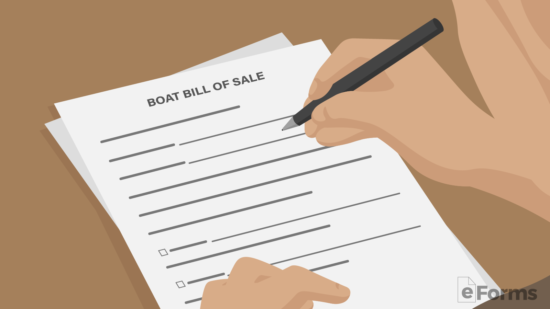
All States require that a boat bill of sale form be signed by the buyer and seller in order to complete the sale. The parties may also use the form to record the sale of the outboard motor and trailer. Copies of the should be given to each party with the buyer requiring a copy for registering and obtaining title with the State.
Step 6 – The Transaction

At closing, the parties should provide:
- Buyer – Payment.
- Seller – Title (signed over to the buyer) and any current registration documents.
The buyer and seller will have to negotiate which party will be subject to the sales tax (%). In most transactions, this is split between the parties.
Step 7 – Buyer Registers the Boat

In most States, the buyer is required to immediately register the boat after the sale has been completed. This is commonly completed by providing the State with the signed bill of sale and title forms along with any registration documents. Depending on the State, there may be a sales tax that is required to be paid at this time. If the seller accepted partial responsibility for it, it still must be paid by the buyer.
How to Write
Download in PDF, MS Word (.docx), or OpenDocument (.odt).
1. Location Of Sale
(1) Bill Of Sale Effective Date. The date when this bill of sale formally transfers ownership of the boat from the Seller to the Buyer must be documented. Generally, this will be the same calendar date as the latest signature provided by the Participants of this record.
(2) County And State Of Sale. In addition to the date when this document becomes active, a record of the County and the State where this transfer of the boat’s ownership occurs must be produced. Section 1 will provide a separate presentation area for the County and for the State where the transfer of boat ownership completes so that follow-up paperwork, procedures, and fees may proceed with the appropriate Entities (i.e. when the Buyer registers the boat as his or her vessel).

2. The Parties
(3) Buyer’s Name. The Buyer who will receive control and ownership of the concerned vessel must be identified in Section 2. Make sure the name produced here appears as it does on his or her Driver’s or Boat License and other government-issued identification.
(4) Buyer’s Mailing Address. In addition to the full name of the Buyer, his or her official mailing address should be dispensed. This must be the same address the Buyer uses for official mail (i.e. when registering a boat).

(5) Seller’s Name. The Seller, typically the Owner of the Boat or a Boat Dealership, should be named as the second Party in the agreement. If this is a Business such as a corporation or partnership, make sure the appropriate suffix required to identify the Boat Dealership is included when naming the Seller in Section 2.
(6) Seller’s Mailing Address. The address where the Seller receives his or her paper mail such as notices or sale inquiries regarding this transaction should be reported once his or her identity has been presented above.

3. The Exchange
(7) Cash Payment. The conditions the Seller requires the Buyer to meet to transfer ownership of the boat should be defined in the third section by selecting one of the choices presented. One of the most common conditions Buyers have to meet to gain ownership of a boat is to submit a “Cash Payment” to the Seller. If the Seller requires that the payment of a cash amount be submitted by the Buyer in order to release ownership of the boat, then select the first checkbox of the Second Section. Keep in mind, this payment may take the form of cash, a check, a certified check, a wire transfer, or any other legal means of tender the Buyer and Seller agree to. In addition to marking the first checkbox in this section, the asking price of the boat must be documented to complete the sale declaration made. It will be assumed that this dollar amount has been paid once this document is signed by the Seller and Buyer.

(8) Trade-In. If the Seller has agreed to accept payment in the form of the Buyer’s boat in exchange for ownership of the concerned vessel, then select the checkbox “Trade-In” and furnish the dollar amount the Buyer must submit with the boat being traded to the Seller. This manner of payment will require that a description be supplied to the statement made.
(9) Trade-In Information. If the Buyer will submit a boat as part of the payment required to gain ownership of the Seller’s boat, then a record of the “Make,” “Year,” “Title Number,” “Hull ID Number,” and “Odometer Number” in hours must be documented. The Buyer must be able to produce this information for the Seller for this option to be effected.
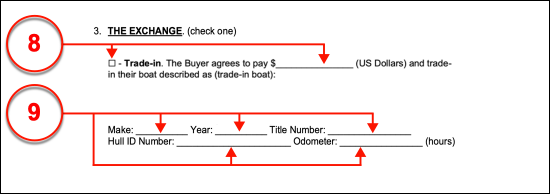
(10) Gift. If the transfer of boat ownership from the Seller to the Buyer will be the result of a “Gift” then the third checkbox definition describing payment should be selected and the value of the boat should be documented to the space available.

4. The Boat
(11) Boat Make, Year, And Title Number. Solidify that the ownership of a boat will be transferred through this document by marking the first available checkbox in Section 4.
(12) Boat Make, Year, And Title Information. Additionally, the Seller must identify the boat being released to the Buyer. This will require a record of the Boat’s “Make” or Manufacturer, the year when the boat was produced for sale, and the title number of the boat. This information can be found through a visual inspection of the vessel and a review of its title.
(13) Boat Hull ID Number And Odometer. The Hull ID number and the number of hours on the vessel’s odometer must be furnished to fully identify the concerned boat. Most vessels will display their HIN (Hull ID Number) near the transom while the odometer will be found near the navigation area.
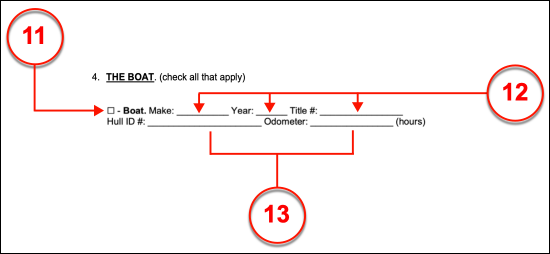
(14) Trailer Make And Year. If the boat sale being discussed will include a trailer then mark the “Trailer” checkbox.
(15) Trailer Basic Information. The name of that trailer’s manufacturer and the year it was produced should be documented as its “Make” and “Year.”
(16) Trailer VIN # And License Plate #. The vehicle identification number and license plate number displayed assigned to and displayed on the trailer must be included. The pole tongue and the back of the trailer will usually display this information.
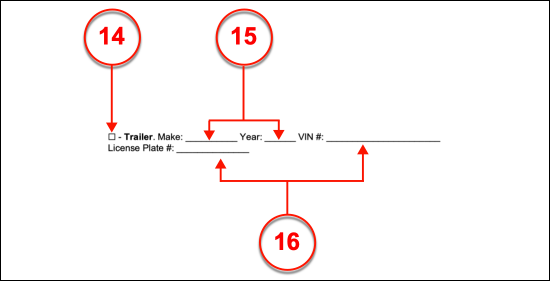
(17) Motor. If the concerned boat has any motors then the “Motor” checkbox should be selected and a recording of the motor’s “Make,” “Year,” horsepower (“HP”), and serial number must be produced. Enough room has been provided for two motors to be documented however if there are more, then additional lines may be inserted. Federal law will require that every (motorized) boat that is less than twenty feet must have a capacity plate displaying the horsepower. If this is not readily available, then the boat’s length must be multiplied by the width of its transom to obtain the boat’s factor which must be compared with Federal Regulations Table 183.53 to obtain the horsepower. It is strongly recommended that a qualified professional (i.e. a Broker or Boat Mechanic) is consulted for this information if it is not readily available on the vessel especially since the structure or design of some boats may cause confusion in reaching an accurate figure.

5. Purchase Price
(18) Boat. The list provided in Section 5 should be reviewed. Each item that was included in this sale must be selected and the payment received defined. Thus, select the checkbox attached to “Boat” and supply the final asking price the Seller required to release ownership to the Buyer.
(19) Motor(s). If the sale includes one or more motors then select the second item. Once done, supply the total cost of all the motors that will be released (with the Boat) to the Buyer.
(20) Trailer. Select the third checkbox if this transfer of ownership will include a trailer. If so, make sure to also furnish the dollar amount required of the Buyer to obtain the trailer where requested.
(21) Total. The prices of the boat, motor, and trailer should be added to a sum, then documented to the final area of Section 5.
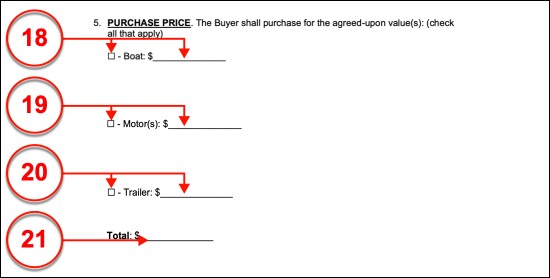
6. Sales Taxes
(22) Included. If the dollar amount the Buyer submitted to the Boat Seller for this sale includes all taxes placed on the asking price, then select the first checkbox statement in Section 6.
(23) Not Included. If the Seller has not included all of the taxes that will be owed for the boat purchase, then select the “Not Included” checkbox.

8. Authorization
(24) Buyer Signature And Buyer Printed Name. This document will solidify the transfer of ownership of a boat to the Buyer and verify that the Buyer has met the obligations placed on him or her. To formally accept ownership of the boat, the Buyer must sign and print his or her name in the “Authorization” section.
(25) Date. The Buyer must verify when he or she has accepted ownership of the concerned vessel by furnishing the current date immediately after completing the acts of signing and printing his or her name.

(26) Seller Signature And Seller Printed Name. The Seller must sign the “Authorization” section to officially release ownership of the boat to the Buyer. Additionally, the Buyer must print his or her name. A formal Business Entity will be required to sign this document through a Representative. Thus, an Entity such as a Boat Dealership may name a specific Representative to handle this area or may allow its Sales Person to sign on its behalf so long as the Signature Party officially represents the Business that formally owns the boat.
(27) Date. After releasing ownership of the boat by signing his or her name and presenting it in print, the Seller must report on the current date.

Notary Acknowledgment
(28) Notary Acknowledgment. The signatures produced by the Seller and Buyer should be notarized. This procedure will aid in verifying that the Buyer and Seller’s identity during the signature process and will satisfy the requirements placed on this document when performing tasks such as registration or obtaining/terminating insurance policies. A specific area at the end of this paperwork has been available exclusively for the use of the Notary Public overseeing the Buyer and Seller’s act of signing.
